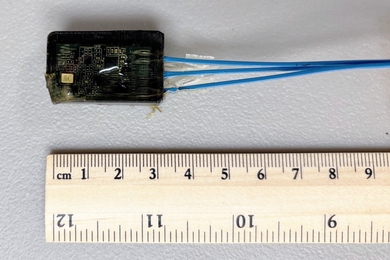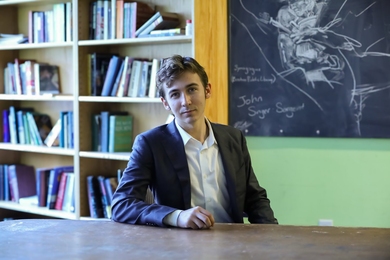The Harvard-MIT Division of Health Sciences and Technology (HST) recently received a federal grant to provide predoctoral training in bioinformatics and functional genomics, establishing the new Bioinformatics and Integrative Genomics Program.
The new program's mission will be to train quantitative scientists in the biology, engineering and information science of genomics. It will address the critical shortage of researchers in functional genomics who must possess quantitative skills to manage and effectively use the huge amount of data generated by the Human Genome Project.
In addition, because many scientists and engineers from various quantitative disciplines are not fully aware of the applicability of their skills to bioinformatics and functional genomics, the Bioinformatics and Integrative Genomics Program (BIG) will provide training in the relevant life sciences and genomic disciplines.
The new program is being funded by a National Research Service Award Institutional Training Grant from the National Institutes of Health.
BIG will be administered through HST's Medical Engineering and Medical Physics program, which trains students in engineering and physical sciences to solve critical problems in science, biology and medicine. Within that program's structure, BIG will address bioinformatics in a broad sense--encompassing the full range of work involved to extract functional dependencies from genomic data.
The BIG program will feature a dual-core curriculum of courses taught at Harvard and MIT. The life sciences core will provide an overall view of integrated cellular function, emphasizing scientific fundamentals and their application. The genomics-bioinformatics core will offer a systematic approach to research in these two areas. Within this second core, students will be exposed to applied probability theory, machine learning techniques, biostatistics and the computational aspects of genomics. Students will have access to Harvard and MIT laboratories as well as associated hospital-based laboratories and research centers.
Faculty in the BIG program will bring together nationally recognized leaders from the basic biological sciences, engineering, computer science, genomics, bioinformatics and epidemiology. Co-directors are Isaac S. Kohane, director of the Children's Hospital Informatics Program and associate professor of pediatrics at Harvard Medical School; and Gregory Stephanopoulos, professor of chemical engineering at MIT. Both are HST faculty members.
Stephanopoulos stressed the need for experts in the fields of bioinformatics and functional genomics. "A large volume of data is being generated that contains high-quality information about intracellular mechanisms and overall cell function," he said. "This creates a tremendous need for well-trained people who can analyze, synthesize and ultimately use these data to describe the function of cells under different environmental conditions."
Students with strong backgrounds in quantitative sciences, including computer science, mathematics, engineering and biophysics, are encouraged to apply. They will receive three years of graduate tuition and stipend support, complemented by funding from individual laboratories for additional years. Applications for enrollment will be accepted for spring 2002. For further information, contact HST's academic office at x3-2307.
A version of this article appeared in MIT Tech Talk on October 3, 2001.





